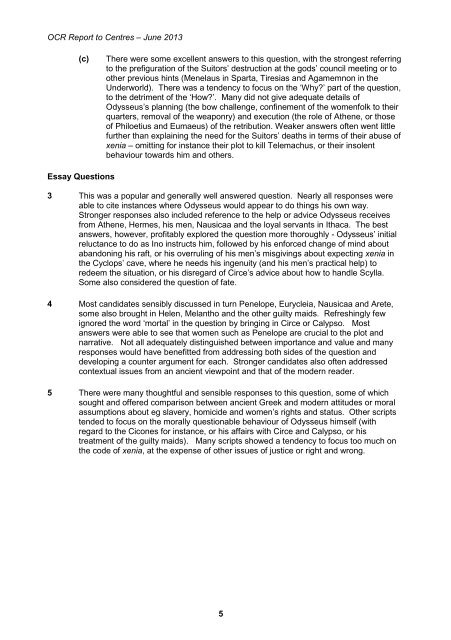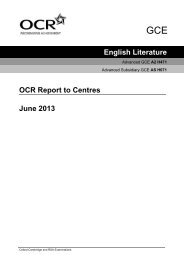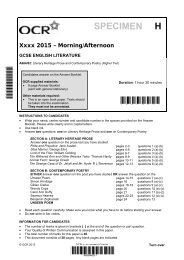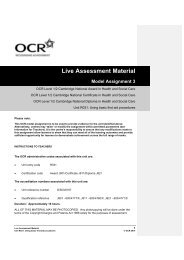Examiners' reports - June (PDF, 440KB) - OCR
Examiners' reports - June (PDF, 440KB) - OCR
Examiners' reports - June (PDF, 440KB) - OCR
Create successful ePaper yourself
Turn your PDF publications into a flip-book with our unique Google optimized e-Paper software.
<strong>OCR</strong> Report to Centres – <strong>June</strong> 2013<br />
(c)<br />
There were some excellent answers to this question, with the strongest referring<br />
to the prefiguration of the Suitors’ destruction at the gods’ council meeting or to<br />
other previous hints (Menelaus in Sparta, Tiresias and Agamemnon in the<br />
Underworld). There was a tendency to focus on the ‘Why?’ part of the question,<br />
to the detriment of the ‘How?’. Many did not give adequate details of<br />
Odysseus’s planning (the bow challenge, confinement of the womenfolk to their<br />
quarters, removal of the weaponry) and execution (the role of Athene, or those<br />
of Philoetius and Eumaeus) of the retribution. Weaker answers often went little<br />
further than explaining the need for the Suitors’ deaths in terms of their abuse of<br />
xenia – omitting for instance their plot to kill Telemachus, or their insolent<br />
behaviour towards him and others.<br />
Essay Questions<br />
3 This was a popular and generally well answered question. Nearly all responses were<br />
able to cite instances where Odysseus would appear to do things his own way.<br />
Stronger responses also included reference to the help or advice Odysseus receives<br />
from Athene, Hermes, his men, Nausicaa and the loyal servants in Ithaca. The best<br />
answers, however, profitably explored the question more thoroughly - Odysseus’ initial<br />
reluctance to do as Ino instructs him, followed by his enforced change of mind about<br />
abandoning his raft, or his overruling of his men’s misgivings about expecting xenia in<br />
the Cyclops’ cave, where he needs his ingenuity (and his men’s practical help) to<br />
redeem the situation, or his disregard of Circe’s advice about how to handle Scylla.<br />
Some also considered the question of fate.<br />
4 Most candidates sensibly discussed in turn Penelope, Eurycleia, Nausicaa and Arete,<br />
some also brought in Helen, Melantho and the other guilty maids. Refreshingly few<br />
ignored the word ‘mortal’ in the question by bringing in Circe or Calypso. Most<br />
answers were able to see that women such as Penelope are crucial to the plot and<br />
narrative. Not all adequately distinguished between importance and value and many<br />
responses would have benefitted from addressing both sides of the question and<br />
developing a counter argument for each. Stronger candidates also often addressed<br />
contextual issues from an ancient viewpoint and that of the modern reader.<br />
5 There were many thoughtful and sensible responses to this question, some of which<br />
sought and offered comparison between ancient Greek and modern attitudes or moral<br />
assumptions about eg slavery, homicide and women’s rights and status. Other scripts<br />
tended to focus on the morally questionable behaviour of Odysseus himself (with<br />
regard to the Cicones for instance, or his affairs with Circe and Calypso, or his<br />
treatment of the guilty maids). Many scripts showed a tendency to focus too much on<br />
the code of xenia, at the expense of other issues of justice or right and wrong.<br />
5
















